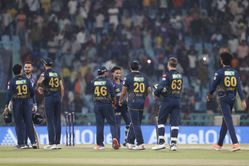The ninth edition of the ICC Men’s T20 World Cup will be hosted by the West Indies and the United States of America between June 02-29, 2024.
Unlike the previous iterations of the global showpiece event, this time 20 teams will compete from the first round itself.
The tournament will see 20 teams divided across four groups- A, B, C, and D,- with every side playing each other once.
Two sides from each group qualified for the Super-8, where the remaining eight teams would be divided into two groups of four each. A team will be allotted a position in either Group 1 or Group 2 depending on their pre-tournament seedings. The top two teams from each group will advance to the semi-finals.
T20 World Cup - Batting Rules
Each team will get 20 overs each to bat.
Like all general rules of batting cricket, batters will earn 1, 2, 3, 4, 5, 6 or 7 runs, depending on the way the things happen on a particular delivery. There are no special rules for batting.
T20 World Cup - Bowling Rules
Each bowler can bowl a maximum of four overs in T20 World Cup matches.
All general rules of cricket for bowling will be applicable.
The TV umpire will also help detect no-balls in T20 World Cup.
The 2024 T20 World Cup will also have the ‘stop clock’ rule, which basically mandates the fielding team to start every over within 60 seconds since the completion of the last. The failure to do so will attract a couple of warnings before a five-run penalty is inflicted for every misdemeanor.
T20 World Cup - Fielding Rules
There will be field restrictions in the powerplay. A maximum of two fielders can field outside the 30-yard circle in the first six overs.
After the first six overs, teams can place upto five fielders outside the 30-yard circle.
T20 World Cup - Wicket Keeping Rules
A wicket-keeper needs to stand behind the wickets at the striker’s end while keeping.
General rules of wicket-keeping to be followed in ICC T20 World Cup 2021.
T20 World Cup - Powerplay Rules
There is a mandatory powerplay of six overs at the start of the innings.
The fielding team can only keep a maximum of two fielders outside the 30-yard circle during the powerplay.
T20 World Cup - Qualification Rules
Twenty teams will be divided in four groups of five each.
Each team will play the remaining four teams from its group once.
Every win will fetch two points while a no-result will fetch one each.
Each tied game will be followed by Super Over (s).
Top two teams from each group will qualify for the Super 8.
| Group Name | Teams |
| Group A | India [A1], Pakistan [A2], Ireland, USA, Canada |
| Group B | England [B1], Australia [B2], Namibia, Scotland, Oman |
| Group C | New Zealand [C1], West Indies [C2], Afghanistan, Uganda, Papua New Guinea |
| Group D | South Africa [D1], Sri Lanka [D2], Bangladesh, Nepal, Netherlands |
T20 World Cup - Super 8 Rules
| Group 1 | Group 2 |
| A1 | A2 |
| B2 | B1 |
| C1 | C2 |
| D2 | D1 |
Eight teams will be divided into two Groups of four each.
The placement of a team in a particular group will depend on its pre-tournament seeding.
In case, a non-seeded team qualifies for the Super 8, it will take the seed of the team it knocked out.
Each team will play three matches in the Super-8.
Top two teams from Group 1 and Group 2 will qualify for the semi-finals.
T20 World Cup - Semi Finals Rules
Unlike the IPL, there will not be a playoff structure in the T20 World Cup.
The top four teams will compete in two semifinals, with winners advancing to the final.
Winner of Group 1 will play against the runner-up of Group 2.
Winner of Group 2 will play against the runner-up of Group 1.
To account for inclement weather, the first semi-final will have a reserve day, while the second semi-final will have 250 minutes of additional time (no reserve day) to ensure a result. The first semi-final will have 190 minutes of additional time on the original match day.
T20 World Cup - Finals Rules
The winners of the two semifinals will qualify for the finals.
The summit clash will get an additional 190 minute leverage to ensure a result on the original day. However, in case the match doesn't get completed, a reserve day has been put in place to ensure a result.






![Venkatesh Iyer perishes cheaply again while trying to take on Sai Kishore in KKR vs GT IPL 2025 match [Watch]](https://statico.sportskeeda.com/editor/2025/04/74785-17452561715815-1920.jpg?h=166)


